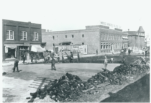Legal Briefs: Dude, where’s your will?
By Les Scholly on August 24, 2019.
scholly@pritchardandco.com If you have a lawyer, accountant and financial planner, you will have been reminded about the importance of having a written will. An equally important question is how you notify your executor where your original will is located. If you have not told your executor where is your will is (or even that you appointed them as your executor in the first place) you may be inadvertently adding to the time and costs associated with administering your estate. In our modern digital world, executors might be more inclined to search for your will online. Unfortunately while the technology may be capable to allow for this, there is no government run Wills Registry in Alberta or Canada. If you look online you will find reference to the Alberta Virtual Vault. This fee for service initiative would allow someone to store copies of their estate planning documents and provide access to your attorney, trustee or executor to the contents of the virtual vault. While it sounds like a good idea, it no longer exists. This may be an example of the risks associated with a non-government body handling these kinds of matters. At the present time the government of British Columbia has a Wills Registry Service. The service allows the will maker to say they have made a will and provide details of your name, birthdate, date you signed your will, the will location and the date you registered your will. More details on the Wills Registry Service can be found at: https://www2.gov.bc.ca/gov/content/life-events/death/wills-registry Another option is the Canada Will Registry with Notice Connect. This is a system where a lawyer who prepares wills can register the details of the wills they have prepared. The lawyer is notified if someone is looking for a will through the registry. More details on the Canada Wills Registry can be found at: https://www.noticeconnect.com/. At this time the lawyer has to opt in to register the wills they prepare. While these online resources can be helpful to executors, the “old school alternative” is to: a) Advise your executor you made a will; and, b) Provide your executor with details of where your original will is located and provide them with a copy of your will. The right option for you will depend on your specific circumstances. Some people do not want their executor (especially if it is a child), to know ahead of time, what is in the Will and who gets what. This may be an important concern where the particulars of a gift (item or dollar sum) is stated in the will or where a certain family member is getting less than others (or nothing at all!). In many wills this not a concern where specific gifts or cash legacies are absent, and the estate is divided equally among children after the last spouse dies. It is important for a will-maker to ask themselves if there is a big concern in sharing the contents of the Will with the executor before they die. Good communication – old school and new school, can go a long way to simplify estate administration and set up your executor for success. I would be happy to hear your thoughts about this topic, please email me at lscholly@pritchardandco.com. Les Scholly helps you navigate the turning points of life. He is a partner with Pritchard & Co. Law Firm, LLP and a member of the Society of Trust and Estate Practitioners (STEP). Contact Les at 403-527-4411 or at lscholly@pritchardandco.com. 17-16




